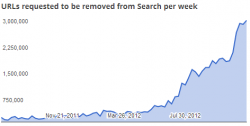Welcome to another edition of our annual Blu-ray sales analysis, where we look at how Blu-ray has performed over the last year.
The data used in this analysis derives from our weekly updates, based on figures released by Home Media Magazine. Some of the historical figures you’ll see have also been adjusted, due to slight tweaking of the metrics used by HMM to create these sets of data, although the changes have been very subtle and does not change the bigger picture in any way.
Last year, we concluded that “peak Blu-ray” had been reached in 2013, and that the format’s fortunes were on the decline ever since. 2016 is a particular interesting year to examine because of the introduction of a new Blu-ray format – Ultra HD Blu-ray.
Can these new fancy 4K discs reverse Blu-ray’s fortunes? Read on to find out!
Blu-ray Market Share
As has been the case with all of our “Blu-ray: The State of Play” reports in the past, we start with the ever wider Blu-ray Market Share graph. Blu-ray market share represents weekly Blu-ray sales as a percentage of total packaged disc sales. So a Blu-ray market share of 45% means that 45% of all disc packages sold in that week contained a Blu-ray disc (inversely, this also means that 55% of disc packages sold only contained the DVD version of the content). With the way sales figures are reported, any edition that includes a Blu-ray version of the film is counted as a Blu-ray package (even if the package also contains a DVD version of the film). Ultra HD Blu-ray sales are also counted in the Blu-ray column. In the graph below, we also point out some of the more obvious milestone releases. 2016’s major releases, at least those that had a significant impact on Blu-ray market share for the week that they were released, were Star Wars: Episode VII – The Force Awakens, Deadpool, Zootopia, Batman v Superman: Dawn of Justice, Captain America: Civil War, Star Trek: Beyond, Finding Dory, and Suicide Squad.

Blu-ray Market Share – 2008 to 2016 – Click to see larger version
Note that because Blu-ray market share is proportional to DVD market share, any drop in DVD sales will also result in a higher Blu-ray market share, even if Blu-ray sales are steady. With DVD on a steady decline, Blu-ray market share will continue to rise as long as it’s own sales decline is slower than that of DVD’s.
Below is the same data condensed and with a trend line added. You might notice a huge peak in the graph during the earlier part of 2016 – this can be explained simply by the fact that Star Wars: The Force Awakens was released that week. I mentioned in last year’s report that the new Star Wars movie could break market share records, and it indeed did, by a considerable margin as you can see from the graph below.
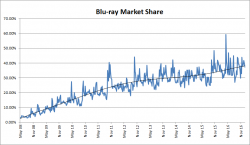
Blu-ray Market Share – 2008 to 2016
Blu-ray Revenue
For actual revenue, unfortunately, no records were broken as you can see from the graph below. Apart from the smaller peak for The Force Awakens, the other peak, the one that you see almost every year at the same time, is for the important Black Friday/Cyber Monday week, and the pre-Christmas sales period. 2016’s peaks are somewhat higher than 2015’s, but the record remains with 2013 (and may always be the case). 2013 being the peak Blu-ray year, at least when it comes to revenue, remains a likely fact for the foreseeable future – it’s not so much that disc sales were so much higher, but that discs costs less per unit than they did in 2013 – so more sales could still mean less revenue, overall, which seems to be the case.
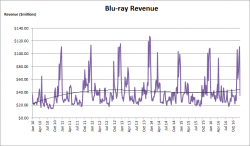
Blu-ray Revenue Growth – 2010 to 2016
2015 vs 2016 Comparison
So let’s take a closer look at how 2016 did compared to 2015, starting with Blu-ray market share as shown in the graph below. Unlike in 2015, the big releases came mostly in the first half of the year, as you can see from the series of peaks early on (with ‘The Force Awaken’ being the biggest peak, followed by ‘Deadpool’, ‘Zootopia’, and ‘Batman v Superman: Dawn of Justice’).
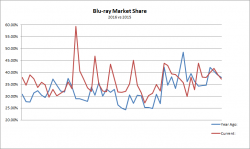
Blu-ray Sales Market Share: 2015 vs 2016 Comparison
Revenue wise, the differences between 2015 and 2016 were less visible. The start of the year wasn’t particularly impressive, but things start to pick up around March, and then after the big releases start to come in. Overall, 2016 looks to be a better year than 2015.
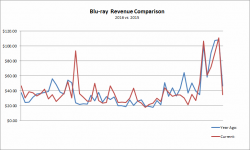
Blu-ray Sales Revenue: 2015 vs 2016 Comparison
We can get a clearer picture by looking at the raw numbers. Out of the 53 reporting weeks in 2016, 29 of them was better than the same week in 2015, with 24 being worse. This compares well to 2015, when 31 of them had a weekly revenue worse than the same week in 2014. The quality of releases may be the bigger driving factor, but it’s hard to ignore the effect of the Ultra HD Blu-ray format, first introduced in early March. If we look at the time period before the introduction of Ultra HD Blu-ray, 6 out of the 11 weeks (55%) were worse than the same weeks in 2015. After, only 19 out of 43 were worse off (44%). If you need further evidence that suggests Ultra HD is having a role in Blu-ray sales, then all you need to do is to follow our weekly sales reports, where you’ll find almost all new major releases now come with Ultra HD editions, some of these editions sell quite well. It’s not only replacing 3D sales, which have severely declined due to lack of consumer interest and the lack of new 3D releases, it also seems to be doing much better than 3D at the same stage of its development (and much better than the original Blu-ray format, during the same period).
But again, just the fact that The Force Awakens was released a couple of weeks after Ultra HD’s launch and continued to chart for most of 2016 could have been enough to help make things better for Blu-ray in 2016. The other major releases, in particular new properties ‘Deadpool’ and ‘Zootopia’, may also have contributed to the better results in 2016.
Whether it’s the Force, or the 4K, either or both helped Blu-ray revenue reverse course for the year and post the first year on year increase since 2014. Total Blu-ray revenue for 2015 was $2.07 billion, compared to $2.095 billion in 2016, a growth of 1.22%.
Conclusion
To sum up:
- Blu-ray market share grew, but it may largely be due to the decline in DVD than any rise in Blu-ray sales
- Star Wars: The Force Awakens was the title to beat in 2016 (and possibly the best selling Blu-ray ever)
- Blu-ray revenue reverses declines from previous two years and posts a small gain, possibly due to the better caliber of releases in 2016 as well as the introduction of Ultra HD Blu-ray.
These results still seem to confirm that 2013 was the peak for Blu-ray sales, but there seems to be a “Rey” of hope for Blu-ray, maybe thanks to Ultra HD Blu-ray. Although with that said, the first few weeks of 2017 have not been good ones for Blu-ray sales, and so perhaps the caliber of releases, as opposed to the newness of the format or the clarity of the picture, is a bigger factor when it comes to sales.
![]()
